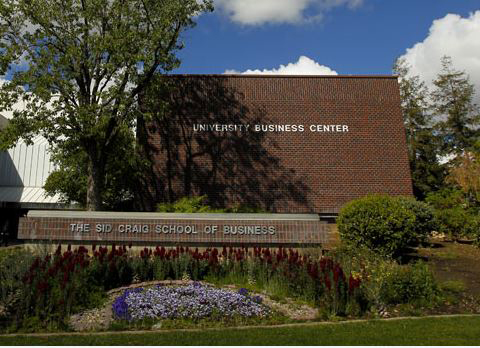
Credit: Fresno State
August 4, 2018 - The San Joaquin Valley Business Conditions Index fell in July, but remains above growth neutral for the 23nd consecutive month — pointing to healthy growth in the next three to six months.
The July index was at 57.5, falling from June’s 58.6. An index greater than 50 indicates an expansionary economy.
The index is a leading economic indicator from a survey of individuals making company purchasing decisions for firms in the counties of Fresno, Kings, Madera and Tulare. The index is produced using the same methodology as that of the national Institute for Supply Management.
“Both durable and non-durable goods manufacturing reported solid gains for the month,” said Dr. Ernie Goss, research faculty with the Craig School of Business at Fresno State. “As in recent months, construction activity in the San Joaquin Valley continued to expand at a very healthy pace. I expect this pace to remain strong for the next three to six months.”
This month, survey participants were asked how tariffs were affecting their business operations. About one-fourth of firms reported tariffs have made purchasing from abroad more difficult. Despite this, four of 10 firms support raising tariffs to put even more pressure on trade partners.
Employment: The employment gauge moved lower to 57.5 from 59.1 in June. “The San Joaquin region has experienced strong job growth at 2.6 percent over the past year, or significantly above the nation’s 1.6 percent expansion over the same period of time. I expect the region to continue to add jobs, but at a somewhat slower pace for the next three to six months,” Goss said.
Wholesale prices: The prices-paid index, which tracks the cost of purchased raw materials and supplies, slipped to 68.6 from June’s 71.5, indicating elevated inflationary pressures at the wholesale level. “I expect rising tariffs and trade restrictions to continue to boost wholesale and consumer inflation growth above the Federal Reserve’s target. This trend has already pushed consumer inflation higher. As a result, in my judgment, the Federal Reserve’s interest rate setting committee will raise short-term interest rates by one-quarter of one percentage point (25 basis points) no later than Sept. 26,” Goss said.
Business confidence: Looking ahead six months, economic optimism, as captured by the business confidence index, fell to a healthy 65.5 from June’s 70.5. “Healthy profit growth and still low interest rates boosted business confidence. However, I expect rising tariffs and trade restriction to shrink business confidence in the months ahead,” Goss said.
Inventories: The inventory index once again fell below growth neutral for July. The index, which reflects the growth or decline in raw materials and supplies, climbed to 47.2 from 47.0 in June.
Trade: The new export orders index climbed to 55.4 from June’s 50.8, while the import index slipped to a solid 49.8 from 55.2 in June. “The expanding regional economy is supporting international purchases from regional businesses,” Goss said.
Other components: Other components of the July Business Conditions Index were: new orders at 63.7, down from 66.0 in June; production or sales at 65.1, up slightly from June’s 65.0; and delivery lead time at 54.1 from last month’s 55.7.
(University Communications news intern Easton Kerby contributed to this report.)
Related Links:
Goss video economic summary: https://youtu.be/2mTDCMPIKyg
Craig School of Business: www.fresnostate.edu/craig/ubc/sjvs.html
Follow Goss: Twitter at http://twitter.com/erniegoss or www.gossandassociates.com
Blog: http://economictrends.blogspot.com
Source: Fresno State Craig School of Business








